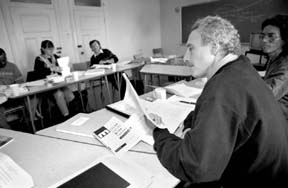
McGill social work professor Eric Shragge leads students in a class discussion in one of the courses in a new joint PhD program offered by McGill and Université de Montréal
October 24, 1996
 McGill social work professor Eric Shragge leads students in a class discussion in one of the courses in a new joint PhD program offered by McGill and Université de Montréal |
Hélèna Katz
Two professors are giving a PhD-level course together. One lectures in English and the other in French. The eight students can ask questions in either language and discussions jump back and forth between the two. Welcome to Canada's only bilingual, bicultural PhD program in social work. Started last month, it's jointly run by McGill and Université de Montréal.
"We wanted a program that would reflect the real diversity of Montreal and the problems that affect the anglophone, francophone and cultural communities," Gilles Rondeau, the program's coordinator, explains.
The Université de Montréal professor will organize the program for its first two years. Then it will be McGill's turn. The job will alternate between the two schools every two years. Even the classes move back and forth between the two campuses from one week to the next.
Students can write papers in their own language, but they must be able to read and understand both English and French.
Shrinking resources and funding opportunities weren't the only reasons for the two universities to join forces and set up the program, says Professor William Rowe, director of McGill's School of Social Work. It was also a chance to create a unique program that would give students both an anglophone and a francophone perspective on their work.
Each culture views social work in a different light. "French social work services are a much more accepted part of the mainstream. This has to do with [the tradition of] the Catholic church taking care of people," Rowe says. "In the French culture, people are less likely to see health services and social services as an individual responsibility rather than a collective one." Anglophones tend to view social services with more of a "people have to look out for themselves" philosophy.
The wider range of perspectives is why Montrealer Cheh Cho transferred to the new program from doctoral studies at Boston University. "Part of the magic of this program is that it's a joint program," he says. "Here we touch on the American, Canadian and Québécois perspectives." Rondeau agrees. "It allows us to build a bridge between the two approaches," he says.
It also brings together the strengths of each university's social work department--be it family dynamics, community development or international studies at McGill or social work administration and policy issues at Université de Montréal.
"We have simply doubled the resource base," Rowe explains. "We have twice as many faculty available to teach and twice as many to supervise students."
The two social work schools are not strangers to collaborating with one another. Université de Montréal houses the Centre for Research on Family Violence and Violence Against Women, a unit involving researchers from McGill, Laval and Université de Montréal, which has funding from Health and Welfare Canada and the Social Sciences and Humanities Research Council.
The new PhD program will result in even more opportunities for students and faculty to work with their counterparts at the other university rather than in isolation within their own departments. This ought to encourage cooperation rather than breed competition, Rondeau says. "We'll be able to combine [forces] rather than saying that one of us is stronger and will crush the other."
Students in the PhD program are being prepared for careers in teaching and research, in policy development and management positions in government or large institutions.
Cho has been wanting to teach since he was an undergraduate at McGill. "That's what I was aiming for from day one," he says.
"When I got my undergraduate degree, you had to have a master's to teach. When I got my master's, you had to have a PhD." Cho wants to teach social workers how to deal with death and dying.
With an aging corps of professors at many universities, Rondeau thinks there will be room for a new generation of teaching staff.
Rowe admits that the bilingual nature of the program restricts the number of students who can be admitted, but it also means the program's graduates will have a wider range of jobs to pick from when they complete their degrees.
"My greatest hope is that it will be seen as an advantage, not a block," he says. The program has already received inquiries from potential students in the United States and as far away as Israel.
"One of our students [Cho] transferred from Boston because it's a bilingual, bicultural program," Rowe says. "It's a pretty powerful statement the first year."